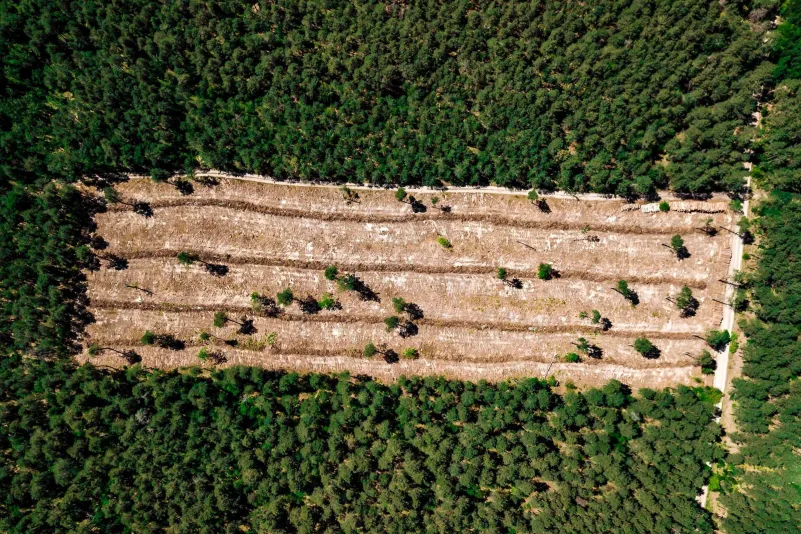European cooperation in forest protection goes hand in hand with the preparation of deforestation-free certification systems. Is Latin America prepared for the new regulations that come into force in December?
European cooperation to protect forests in Latin America is accompanied by technical assistance in preparing the entry into force of the first provisions of EU Regulation No. 1115 in December 2024, with the aim of preventing these materials from entering the market in Europe lead to deforestation.
These include cattle, cocoa, coffee, palm oil, soybeans and timber. There are only six companies doing this, but the possibility that their products will not be able to reach the European market has caused outrage in agricultural exporting countries.
“Resolution 1115 has caused great uproar in Paraguay and other countries exporting agro-industrial products“explains Matteo Sirtori, Head of Cooperation of the European Union Delegation to Paraguay.”It is important to emphasize that Paraguay is an export and agricultural economy country with clear economic importance, as well as a very important political influence: for this reason, we have started a long-term dialogue to clarify the scope of the regulations and some technical issues.“. Sirtori continued.
A correct and controversial decision
While the European Union takes responsibility for its own consumption through deforestation-free regulations and wants to prevent deforestation worldwide, certification represents an obstacle for exporting countries. The Latin American producing countries refer to this regulation as “green protectionism”.
How are regulations implemented in Paraguay? “There are very different opinions; There are very important viewpoints in the private sector and others who understand the need to follow these principles. Not because the EU imposes them, but because the market demands: more sustainable development, more transparency, more traceability“continued the expert, recalling that this regulation has been discussed for a long time. Environmentalists have been calling for such a regulation from civil society for decades.
Does Regulation 1115 worry exporting countries like Costa Rica? Less than others. “Costa Rica has been deforestation-free for more than 15 years. However, given the challenges it poses, the Costa Rican export sector had to prepare for its entry into force,” explains Sylvia van der Laat, Costa Rican Ministry of Foreign Trade and Special Envoy for European Aircraft.
In addition, as part of a pilot project by the Costa Rican Coffee Institute (ICAFE), the United Nations Development Program (UNDP) and the CooperTarrazú cooperative, the first exports of “deforestation-free” coffee were carried out on March 14 to the Italian market.
🇨🇷 #Costa Rica carries out the first coffee export without deforestation ☕
Italy will be the first country in Europe to enjoy this coffee, importing almost 19,000 kilos.➡️More information: https://t.co/Getg6XIWFU@UNDP_CR #Innovation #Productivity #SDGs #Sustainable development pic.twitter.com/DBjlP2b7SI
— UNDP Latin America and the Caribbean (@PNUDLAC) March 25, 2024
According to UNDP “The proposed methodology developed is intended to be a first for the country and can be expanded to other products and value chains that can also ensure freedom from deforestation when entering the European market.“. Costa Rica accompanies this process through a technical team that includes the Ministries of Agriculture and Livestock, Environment and Energy, and Foreign Trade. The aim is to avoid disruptions in existing trade flows.
Can I export models from Costa Rica to Paraguay? “There are many models and each country develops its own model to ensure traceability. Here we take a closer look at what they are doing in their neighboring countries of Argentina and BrazilSirtori replied.
The national platform ViSeC (Sectoral Vision of the Argentine Gran Chaco), which brings together actors in the soybean value chain to reduce environmental impact, will be the path that Paraguay chooses and that will be adapted to the local reality. “Thanks to this system, Argentina, which exports a lot to Europe, begins to ship 100% deforestation-free soybeans“Sirtori added.
It is worth remembering that the six raw materials to which rubber is added are responsible for 58% of global deforestation related to agriculture. A third of all these raw materials are destined for the European market. If no action is taken, deforestation will increase by about 248,000 hectares per year by 2030.
Global trend
“Regulations should be developed in line with global trends for sustainable development. There are now European regulations; There is a similar law in England; This is being discussed in the USA.“Sirtori continued.
And if there is a transition period, it is likely that there will be “free deforestation” in countries exporting agricultural products to the EU and other less demanding markets, as has been the case so far. Sirtori emphasized that the private sector is becoming less willing to buy controversial products that could jeopardize the importer’s image.
For his part, “Costa Rica believes it is time to reap the rewards of the last 30 years of investments in environmental issues and the fight against deforestation“, explained Van der Laat and concluded: “This has allowed the country to go from having forest cover of just over 30% of its territory in the early 1990s to over 60% in 2024.“.
With information from:
